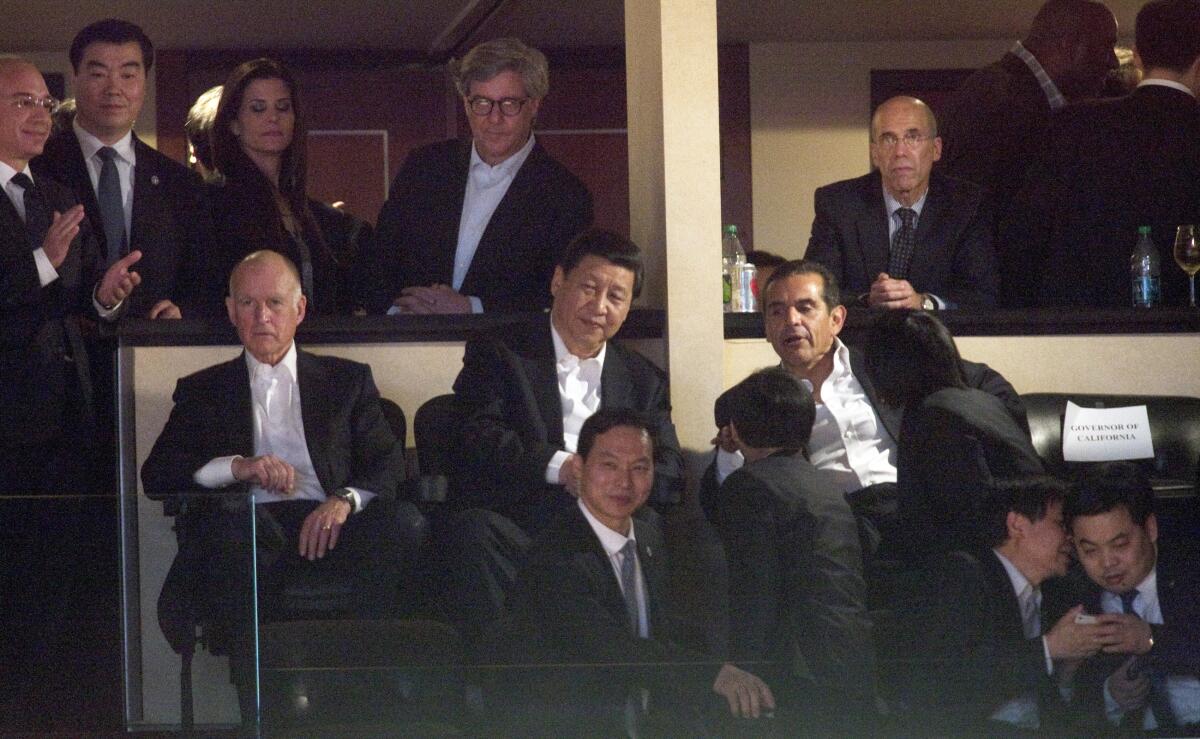How Joe Biden won friends in Hollywood by helping studios get their movies into China

- Share via
WASHINGTON — When then-Vice President Joe Biden hosted Chinese leader Xi Jinping for a five-day diplomatic blitz in 2012, a Hollywood Democratic mega-donor kept popping up with them.
There was Jeffrey Katzenberg, then the head of DreamWorks Animation, dining alongside Xi, the then-vice president of China, at a State Department welcome lunch in Washington. And there he was again, standing just behind Xi, then-Gov. Jerry Brown and then-Mayor Antonio Villaraigosa at a Lakers game in Los Angeles. And there was Katzenberg hanging out in a nearby hallway with Disney CEO Robert Iger to provide last-minute counsel as Biden closed a deal in which China committed to considerably expand its market for American films.
On the final day of Xi’s visit, Dreamworks announced Xi had signed off on the company’s own deal — the launching of Oriental DreamWorks, a $330-million joint venture with Chinese companies to develop and distribute animated films in China.
Several of the candidates vying for the Democratic presidential nomination have significant support in Hollywood — Katzenberg, for example, has kicked in $2,800 each to 14 of them already — but none has as long a history of delivering for the industry as Biden.
His deep ties to studio executives and decades-long advocacy for their agenda has helped cement Biden’s support even as it may also open him to criticism for too cozy a relationship with big donors.
Biden is returning to Hollywood this week for another round of fundraisers, including the second Biden event co-hosted by Katzenberg and leaders of several major studios. Biden’s first Southern California fundraiser, which Katzenberg co-hosted in May, netted more than $700,000 in one night.
“Joe was our champion inside the White House,” said former Sen. Christopher Dodd, who led the Motion Picture Assn. of America for much of the Obama era.
“There is no question about it. Even before Joe Biden decided to run, I would get calls and have conversation with the major studio figures, with them saying, ‘You tell Vice President Biden 100% we want him to run.’ This wasn’t waiting around to see who would do well in polls.”
“During some very tough days, he was one of the few people who stood up and believed they had a legitimate case,” Dodd said.
But as with so much of Biden’s history, his long support for the movie industry creates both benefits and problems. At a time when money in politics is a central issue, Biden’s big donors taint him for some Democratic primary voters. Two of Biden’s top rivals, Sens. Elizabeth Warren of Massachusetts and Bernie Sanders of Vermont, are disavowing big fundraisers and “bundled” contributions, arguing they fuel the public perception that access to decision makers is for sale.
That perception is not unreasonable, said Aynne Kokas, author of the book “Hollywood Made in China” and a film industry scholar at University of Virginia’s Miller Center for Public Affairs. Katzenberg’s presence at events with Xi reflected “the access Katzenberg had to the Obama administration,” she said, adding that raising millions of dollars for the Obama-Biden ticket surely helped.
Biden’s campaign insists that his advocacy for the industry had no relationship to the industry’s political support.
“Protecting American intellectual property, opening new markets and ensuring better labor standards around the world is the job of any American administration. Vice President Biden has always been a fierce advocate for American industry throughout his career, including the film and television industry, which is one of our country’s major exports. The suggestion that his leadership on these issues was motivated by anything other than promoting good policy is ludicrous,” campaign press secretary T.J. Ducklo said in a statement.
Katzenberg advisors take exception to any suggestion the studio executive’s giving is related to White House access.
“This is pure fantasy,” said Andy Spahn, who has long advised Katzenberg on political involvement. “Jeffrey Katzenberg is supporting multiple candidates in the Democratic presidential primaries, and his politics have never been influenced by business interests.”
While Katzenberg has helped Biden in a big way this race, he remains uncommitted. Katzenberg has also co-hosted fundraisers for others, including California Sen. Kamala Harris. South Bend, Ind., Mayor Pete Buttigieg and New Jersey Sen. Cory Booker.
Diplomats with experience on commercial negotiations said that having business executives tag along with foreign leaders on state visits was a standard practice. Katzenberg was only one of many invited to play such a role.
“It is very common for top CEOs of an industry to piggyback on the visit of a foreign leader if their issue is hot,” said Daniel Russel, who was integrally involved in the Xi visit in his role as the president’s special assistant on East Asia at that time.
“If they are in big negotiations, they want to cozy up to the foreign leader. They want to signal their respect. They want to work the room, work the margins.”
But Russel said Katzenberg played no part in the decision by administration officials that Biden should use the Xi visit as an opportunity to push film industry negotiations.
“In dealing with the Chinese, there are precious few points of leverage,” Russel said. “Ensuring the Chinese leader has a successful trip is one of the critical crowbars an American policymaker has to try to open a closed door.”
Xi was visiting Los Angeles as part of his trip, and enabling Xi to announce a breakthrough deal while in Hollywood gave Biden leverage, he said.
In truth, studio executives would have had no need to push Biden to help them: Long before Biden was vice president and the film industry had any interest in steering cash his way, he was aligned with Hollywood.
Biden was a loyal partner to the studios a decade ago in their bruising, and ultimately unsuccessful, battle with politically savvy Internet firms over online piracy. He continued pushing strict rules to limit copying of films long after other Hollywood allies abandoned the effort amid public backlash.
“I was being called Darth Vader because I was arguing for intellectual property and copyright protections,” Dodd recalled. “It was rough. And Joe Biden was just terrific. He didn’t weave or duck or bob. He stayed with it.”
Inside the White House, during heated debate over whether President Obama should sign the Stop Online Piracy Act, which Hollywood had advocated, Biden kept pushing, Dodd said. Even after Obama decided against the bill, which the tech industry vehemently opposed, Biden argued for compromise rules that would give Hollywood some of what it wanted.
Biden’s copyright crusades predated the modern Internet. The MPAA and Recording Industry Assn. of America looked to him as a reliable vote over decades on the Senate Judiciary Committee.
Internet-freedom advocates, who long fought with the entertainment companies, were so disenchanted with Biden by the time he joined the Obama ticket in 2008 that he received one of the lowest scores in CNET’s Technology Voters Guide, which ranked senators on a decade of votes.
The online tech publication provided a long list of grievances related to Biden’s history as “a staunch ally of Hollywood and the recording industry in their efforts to expand copyright law.”
During his first year in the White House, Biden convened a White House meeting of top studio executives to collaborate on combating online piracy. Months later, the studios cheered Biden’s launch of a White House initiative targeting what he called online theft.
As the political ascendancy of the tech industry made such efforts increasingly complicated, Biden pivoted to championing Hollywood’s cause in trade. Hollywood applauded his advocacy for the Trans-Pacific Partnership, the international trade deal focused on east Asia that the Obama administration negotiated. The deal promised to strengthen copyright protections and remove tariffs on DVDs.
The agreement became another political liability for Biden after complaints by progressives — and populists on the right like President Trump — that it did not adequately protect American workers. By 2016, TPP was so toxic that Democratic nominee Hillary Clinton, who had once praised the trade deal as a “gold standard,” was announcing her opposition. Biden’s campaign won’t say if he still supports it.
But international deals like the one Biden brokered with Xi on behalf of the film industry are something the former vice president is eager to highlight, even if renewed trade tensions and government censorship in the years that followed left Hollywood — and DreamWorks — unable to achieve all the hoped for inroads.
His history has made the state’s biggest entertainment industry donors particularly comfortable opening their checkbooks to Biden, who also has some key staff members with entertainment industry backgrounds.
“He has a track record the others, pure and simple, don’t have,” said former California Controller Steve Westly, a leading Biden fundraiser in the state.
More to Read
Get the L.A. Times Politics newsletter
Deeply reported insights into legislation, politics and policy from Sacramento, Washington and beyond. In your inbox three times per week.
You may occasionally receive promotional content from the Los Angeles Times.











